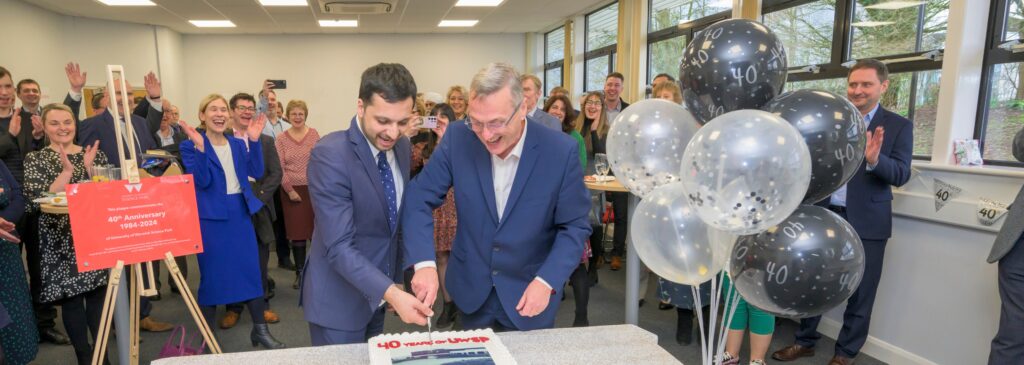
Science parks play a critical role in turning concepts into commercial reality. But what is a science park, exactly? And why are they so vital to the UK’s innovation landscape?
Read on as we break down the idea of science parks, explore their contribution to the national economy, and share how at the University of Warwick Science Park, we stand as a leading example of collaborative innovation.
What is a science park?
In simple terms, a science park is a property-based development designed to support the growth of science and technology businesses. They are often located near universities or research institutions. These parks bring together researchers, entrepreneurs, and high-growth companies in one space to help ideas flourish.
Science parks typically include office spaces, laboratories, meeting rooms, and shared facilities, all set up to make it easier for businesses to access the resources they need. Most also offer specialist support services aimed at helping start-ups and SMEs to grow, like mentorship and funding guidance.
Key characteristics of science parks
To fully understand “what is a science park?”, it’s helpful to look at the key features they have:
- Proximity to universities and research institutions: Many science parks are affiliated with or located near universities, allowing businesses to collaborate closely with students and access new talent.
- A hub for knowledge-based businesses: Science parks attract high-tech companies, research-led start-ups, and innovative SMEs across sectors such as engineering, life sciences, AI, and clean energy.
- Support services for growth: From tailored business mentoring to access to investor networks, science parks are designed to help businesses thrive.
- Commercialisation of research: Science parks offer an environment where university research supports the development of products and services, driving broader economic benefits.
The role of science parks in the UK’s innovation ecosystem
Science parks are the engines of innovation. By having collaborative spaces where academics can be introduced to entrepreneurial opportunities, they can help accelerate new research and development. Science parks also encourage cross-sector collaboration and partnerships between new and established industry professionals.
This mix of ideas and talent makes it easier to bring new technologies to the market and adapt quickly to emerging challenges. In short, science parks help turn innovative thinking into a tangible impact.
How do science parks contribute to the UK economy?
Science parks are important in the UK’s knowledge economy. They create thousands of jobs, help launch and scale high-potential businesses, are home to local supply chains and boost the economy of towns and cities by attracting investment and encouraging innovation. By anchoring investment and talent in specific locations, they help build strong local economies.
Many science parks also align with the UK’s Modern Industrial Strategy by supporting government goals around advanced manufacturing, clean energy industries, digital technologies and life sciences to help address barriers to growth.
The history of the University of Warwick Science Park
Established in 1982 as a partnership between the University of Warwick, Coventry City Council, Warwickshire County Council and the former West Midlands Enterprise Board, the University of Warwick Science Park was one of the UK’s earliest science parks, inaugurated by Margaret Thatcher and remains one of the most successful.
Today, the science park is wholly owned by the University of Warwick and spans four locations: the main campus next to the University of Warwick which is home to The Venture Centre and our Scale Up Space, the Business Innovation Centre in Binley, the Warwick Innovation Centre on Warwick Technology Park, and the Blythe Valley Innovation Centre near Solihull.
Its location in the West Midlands has direct links to major cities, transport hubs and, crucially, the University of Warwick. It puts businesses at the heart of a vibrant regional innovation ecosystem.
Facilities and Business Support
The University of Warwick Science Park provides more than just office space. It offers modern spaces for laboratory use, workshop spaces, flexible co-working areas, meeting rooms and high-spec office units that are tailored to the needs of growing tech companies.
Some of the University of Warwick Science Park’s support services include:
- Business incubation through the Ignite programme
- Access to a network of Business Angels through Minerva Business Angels
- Access to business support, mentors and industry specialists
- Help securing venture capital, angel investment, and grant funding
This approach ensures businesses have the tools they need to innovate, scale, and most of all, succeed.
Collaboration & innovation
One of the park’s core strengths is its ability to foster genuine collaboration between business and academics. Companies based here often work closely with researchers and students from the University of Warwick through joint R&D projects, student placements or by drawing on academic expertise to solve technical challenges.
This connected approach creates a positive environment where ideas are shared and accelerated, helping to develop next-generation technologies and solutions.
Science parks supporting the innovation journey
Innovation rarely happens in isolation. It thrives in environments that bring together ideas, resources, and the right support systems. Science parks play a critical role in nurturing this ecosystem by bridging the gap between entrepreneurs and the tools they need to succeed.
Access to funding and expertise
Funding can be one of the biggest barriers to innovation, and science parks help break it down. The University of Warwick Science Park connects businesses with:
- Early-stage investment and scale-up funding
- Grant writing and R&D tax credit advice
- Business mentors, consultants, and talent from the University of Warwick
This ecosystem of support helps de-risk innovation and shorten the journey from idea to market.
Community and networking
Science parks aren’t just a workplace, they create communities. The University of Warwick Science Park regularly hosts events, workshops, and networking opportunities for locals that connect people from all aspects of innovation; business leaders, investors, academics, and innovators.
It’s a place where peer-to-peer learning thrives, and where many successful businesses have taken their first steps.
The future of science parks in the UK
Science parks are evolving. The UK is seeing growing demand for:
- Deep tech and AI innovation hubs
- Sustainable and net-zero focused campuses
- Digitally connected, globally competitive environments
- Laboratory accommodation for the Life Sciences
At the same time, science parks face challenges around infrastructure investment, regional equity, and long-term funding sustainability.
Warwick’s continued leadership
The University of Warwick Science Park is well-positioned to remain at the forefront of UK innovation. With plans to expand its offering and deepen ties with industry while further investing in sustainability and digital infrastructure, it continues to play a key role in shaping the UK’s innovation future and nurturing the next generation of high-growth businesses.
Why are science parks important?
Science parks are hugely important in bridging the gap between groundbreaking research and real-world application. They drive economic growth and help the UK remain globally competitive.
The University of Warwick Science Park is a leading example of this model in action. We support businesses and assist in powering the future of innovation.
Want to learn more or explore how The University of Warwick Science Park could support your business? Please feel free to contact us with any questions or to schedule a tour. A member of our team would be happy to assist you!






